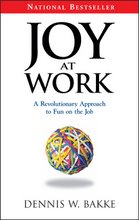In one of my periodic nighttime visits to the AES plant in Pennsylvania, I found Francis in the main control room, operating the facility. He had worked at the plant for 30 years. During the course of our conversation, I mentioned that there would likely be a bonus for everyone at the plant because of the improved performance of the boilers and turbines. It would be the first bonus ever for union members like Francis.
“They’re going to shut it down,” he grunted. “They’re going to do what?” I asked incredulously. “By the way, who is ‘they’ anyway?” But Francis was convinced. “There is no way that they will allow us to get that bonus. The boilers will be shut down sometime before the end of November.” I muttered something to the effect that it didn’t make economic sense to shut the boilers down to avoid paying a bonus and then left. The bonus checks were handed out at a plant celebration a little over a month after my visit. As Francis received his check, the plant manager reminded him of his earlier conversation with me. “The boilers didn’t get shut down, and you got your bonus,” the plant manager said cheerily. Without any hesitation or hint of a smile, Francis said, “Yeah, but they took out taxes.”
It took years to change the victim mentality engendered by Industrial Revolution assumptions about workers. Some people were never able to change. Early in our encounters with people who had worked in industrial settings for more than a few years, we noticed a strong tendency to blame some unnamed and invisible “they” for every decision the employees didn’t understand or agree with. Eventually, that led to a company-wide “anti-they” campaign. Our purpose was to find the “theys” who seemed to be in charge of all injustices in our company and expose them as quickly as possible. The company’s success was evident less than a year later when a reporter visited our Placerita plant in California. “Everyone talks about ‘we’ around here. What a difference from other businesses I visit.”
If employees are constantly using the word "they" to refer to a mysterious person or group that makes all the decisions, it's a sure sign that there is a great divide between management and labor. In fact, with the Joy at Work approach, there should be no separate management people. There is only one category of employee within the organization.
My experience suggests that there are 9 main obstacles to eliminating the "theys" and implementing the Joy at Work approach:
(1) Managers and bosses won’t restrain themselves from making decisions. Leaders believe it is their right to do so. They are “in the best position” to make the call. By a large margin, their refusal to delegate responsibilities is the reason that so many people are bored and unhappy in their jobs.
(2) Leaders have the wrong motives. They may allow subordinates the freedom to make significant decisions, but they do so primarily because they believe it will lead to financial success or serve other objectives unrelated to a fun workplace. Working people aren’t fooled.
(3) The organization’s purpose is shallow or selfish. If employees can’t adopt the mission of a company as their own, and if they can’t see why it’s worthwhile to society, the likelihood of joy at work diminishes dramatically.
(4) Mistakes are often attributed to systems rather than to human error or outside forces. When mistakes are made by lowerlevel employees in decentralized organizations, blame is often assigned to the practice of delegating decisions. The result: a return to the top-down, hierarchical structures of the past.
(5) Information is provided only to senior executives and board members. Sharing information, including financial data, with every employee is crucial to fun workplaces. It makes people feel trusted and important.
(6) Senior executives certify all information required by the government. Unless ways are found to circumvent this regulatory rigamarole—at AES, we would make plant people “officers” so they could perform certifications—lower-level employees are marginalized.
(7) Boards of directors require decisions to be made by themselves or by senior leaders. Board members work part time and typically get to know only a few top executives. Because directors are unfamiliar with people at lower levels, they tend not to seek their advice or rely on their expertise. When excluded from decisions, employees become estranged from the enterprise.
(8) Management and labor are adversaries. Hourly pay, overtime work, unions, perks, uniforms, and numerous other artificial and unnecessary distinctions create a class system in the workplace.
(9) Employees are treated like children. Paternalism and the desire for security prevent people from taking risks andresponsibility.
Many have lost the passion that is both the cause and result of a wonderful workplace. Workplace passion comes from doing something that we believe is important. If only we could all be as passionate about our work as Michael Jordan was when he played basketball. Passion means that no one keeps track of time. No one says “it’s just a job.”
Eliminating the "theys" in your organization is not done overnight. Remember, the key to Joy at Work is giving people (at all levels) the freedom to reason, to make decisions, and to take reponsibility for their actions.
Thursday
Subscribe to:
Post Comments (Atom)


No comments:
Post a Comment